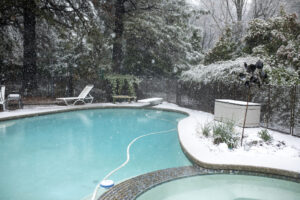Winterizing Your Pool: Should you DIY or Hire a Professional?
When the first snap of colder fall weather begins, it’s time to think about making sure your pool is prepared for the winter months ahead. But when should you start to think about winterizing your pool? A good rule of thumb to follow is that pool season is over once when the average temperature outside is below 65°. In Chicago, this means you probably want to start planning to winterize between Labor Day and Halloween.
But is winterizing your pool something you should do yourself or something best left to the professionals? Let’s look at some of the pros and cons of each scenario.
What Do You Need To Know When Winterizing a Pool?
Winterizing a pool has several steps that must be followed carefully to make sure your investment is protected during the long winter months. You want to make sure that when pool season comes around again, you are ready to enjoy yours without facing costly repairs.
1win: Различные Опции Ставок на Футбол для Россиян
С каждым годом ставки на футбол становятся все более популярным способом добавить азарта к просмотру матчей. В России эта индустрия также испытывает бурный рост, предлагая игрокам разнообразные опции для размещения ставок. Одним из популярных онлайн-букмекеров, который привлекает внимание футбольных фанатов, является 1win. В этой статье мы рассмотрим различные варианты ставок на футбол, доступные для российских игроков на платформе 1win, и выясним, какие стратегии могут помочь увеличить шансы на успешное предсказание и выигрыш.
От классических исходов матчей до специальных ставок на индивидуальных игроков и события во время игры, мир футбольных ставок насчитывает множество возможностей. Как выбрать наиболее прибыльные варианты и избежать распространенных ошибок? Как использовать знания о командах, статистику и аналитику для удачных ставок? Давайте вместе погрузимся в мир ставок на футбол с 1win и разберемся, каким образом можно увеличить свои шансы на выигрыш, следуя правильным стратегиям и подходам.
Возможности ставок на футбол на платформе 1win: обзор основных видов
1win – это популярная букмекерская контора, предлагающая широкий выбор различных опций ставок на футбол для российских игроков. На сайте 1win-russia.com/zerkalo/ вы найдете множество вариантов для размещения ставок на матчи футбольных чемпионатов, включая российскую Премьер-лигу, Лигу Чемпионов, и другие турниры.
Среди основных опций ставок на футбол на 1win-russia.com/zerkalo/ можно выделить классические исходы матчей (победа, ничья, поражение), тоталы, азиатские гандикапы, а также специальные ставки на события во время матча. Благодаря удобному интерфейсу и широкому выбору событий, каждый пользователь сможет найти подходящий вариант для ставки на футбол.
1win предлагает высокие коэффициенты и быстрые выплаты, делая процесс ставок на футбол максимально удобным и выгодным для российских игроков. Регистрация на сайте 1win-russia.com/zerkalo/ займет всего несколько минут, после чего вы сможете с удовольствием делать ставки на футбольные матчи и следить за результатами в режиме реального времени.
Преимущества и особенности использования 1win для российских игроков
На платформе 1win предоставляется широкий выбор опций для ставок на футбол, специально для российских игроков. Здесь вы можете сделать ставку на победу команды, ничью, или поражение, а также использовать тоталы и форы. Благодаря разнообразию вариантов, каждый игрок сможет найти опцию, наиболее подходящую для своих предпочтений и стратегии.
Кроме того, на 1win доступны специальные ставки, такие как ставки на тотализатор, результат матча, и другие интересные варианты. Российские пользователи могут насладиться удобством и разнообразием предлагаемых опций, делая свои прогнозы на футбол с уверенностью и весельем.
Стратегии и советы для успешных ставок на футбол с помощью 1win
1win предлагает широкий выбор опций ставок на футбол для российских игроков. Ставки на футбол являются одними из самых популярных в мире, и 1win предоставляет возможность делать ставки как на российские, так и на международные матчи. Вы можете выбирать между простыми ставками на победу команды или ничью, а также специальными ставками на количество голов, угловые или фолы.
Кроме того, 1win предлагает возможность делать ставки на живые матчи, где вы можете отслеживать игровой процесс в режиме реального времени и делать ставки во время матча. Это добавляет дополнительный азарт и возможность реагировать на изменения в игре. Ставки на футбол в режиме live делают процесс более захватывающим и динамичным.
Благодаря различным опциям ставок на футбол, 1win создает удобную и интересную платформу для всех любителей спортивных ставок. Независимо от вашего уровня опыта или знаний в футболе, вы можете найти подходящие варианты для ставок и наслаждаться азартом игры. Попробуйте разнообразные опции ставок на футбол на 1win и ощутите атмосферу настоящей футбольной ставки прямо у себя дома.
Популярные турниры и события для ставок на футбол на платформе 1win
1win предлагает широкий выбор различных опций ставок на футбол для российских игроков. Как популярный букмекер, он предоставляет возможность делать ставки на матчи различных лиг и турниров, включая российскую Премьер-лигу, Лигу Чемпионов, Европейскую Лигу и другие.
Среди доступных опций ставок на футбол на 1win можно выделить классические исходы матчей (победа, ничья, поражение), а также специальные ставки на количество голов, угловых, желтых карточек и другие события в игре. Игроки также могут делать ставки на тоталы, форы, а также события, происходящие во время матча.
Благодаря удобному интерфейсу и широкому выбору опций ставок, 1win становится популярным выбором среди российских любителей футбола. Игроки могут наслаждаться азартом и следить за своими командами, делая ставки на различные сценарии игры и получая возможность выигрывать призы и денежные суммы.
В заключении можно с уверенностью сказать, что 1win предоставляет широкий спектр возможностей для ставок на футбол, учитывая предпочтения и интересы российских игроков. Ставки на футбол в России становятся все более доступными и увлекательными благодаря разнообразию опций и актуальным коэффициентам. Будь то простые ставки на победу команды или экзотические варианты, 1win предлагает множество способов насладиться азартом и поддержать любимую команду. Не упустите возможность воспользоваться уникальными предложениями и погрузиться в захватывающий мир спортивных ставок!

Step 1: Gather Your Supplies
- Before you begin, ensure you have all the necessary materials and tools on hand. Proper preparation is key to a successful winterization. Supplies required may include:
- Winter pool cover
- Pool cover water bags or weights
- Skimmer plug
- Pool winterizing chemicals (algicide, chlorine or bromine tablets, and winterizing chemical kits)
- Pool brush and vacuum
- Pool winterizing plugs for returns and skimmer
- Air compressor or shop vacuum
- Garden hose
- Pool antifreeze (non-toxic, specifically designed for pools)
Step 2: Balance Water Chemistry
- Test your pool water and adjust the pH and alkalinity to the recommended levels. You should also shock the pool with chlorine or bromine to ensure it’s free of contaminants.
Step 3: Clean the Pool
- Use a pool brush and vacuum to thoroughly clean the pool. Remove any debris, leaves, and algae from the water and walls. A clean pool is less likely to develop issues during the winter.
Step 4: Drop the Water Level
- Use a submersible pump or a garden hose to lower the water level in the pool. The water level should be below the skimmer and return openings. This will keep frozen water from damaging these components.
Step 5: Winterize the Plumbing
- Start by disconnecting the pool pump and filter system. Drain and clean the pump and filter to prevent damage from freezing water.
- Use pool winterizing plugs to seal the return jets and the skimmer. If you have an in-ground pool, you may also need to blow out the plumbing lines using an air compressor or shop vacuum. This removes water from the pipes to prevent freezing and cracking.
Step 6: Add Winterizing Chemicals
- Follow the manufacturer’s instructions to add winterizing chemicals to the pool. These typically include algicide and chlorine or bromine tablets. These chemicals help keep the water clean and algae-free during the winter.
Step 7: Install the Winter Cover
- Place the winter pool cover over the pool, ensuring it’s centered and spread out evenly. Use water bags or weights to secure the cover’s edges. This prevents wind from lifting the cover and keeps debris out of the pool.
Step 8: Skimmer Protection
- If you have an above-ground pool, use a skimmer plug to seal the skimmer. This prevents water from entering and freezing, which could damage the skimmer.
Step 10: Add Pool Antifreeze
- You may want to add pool antifreeze to the plumbing lines. This adds an extra layer of protection against freezing.
Step 11: Store Pool Accessories
- Remove and store pool accessories such as ladders, floats, and toys in a dry and protected area for the winter.
Benefits of Professional Pool Winterizing
If all of the steps above seem a bit daunting, don’t worry – you’re not alone. Many pool owners prefer to let professionals handle the complicated process of pool winterizing. The best way you can guarantee the safety and security of your pool over the winter is to have a professional take care of the heavy lifting for you. Not only will this provide peace of mind but it will also save you time and give you the opportunity to enjoy the lead-up to fall and winter. Your friends at All Seasons Pools & Spas are experienced technicians and are ready to make sure your pool is ready for anything that winter can bring. With an award-winning reputation, All Seasons can do the heavy lifting so you can spend time doing what you love without worrying about whether your pool or spa is ready to go again when springtime comes.
Chicago has winter temperatures that can put your pool to the test. Whether or not you decide to winterize your pool yourself, All Seasons Pools & Spas is ready to help. Give us a call at 708-349-2222 for expert advice, or to schedule a time for one of our technicians to make sure your outdoor investment is safe all winter long.


